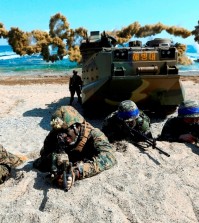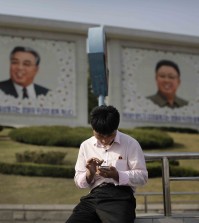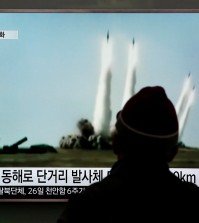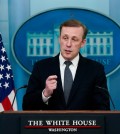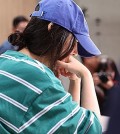- California Assembly OKs highest minimum wage in nation
- S. Korea unveils first graphic cigarette warnings
- US joins with South Korea, Japan in bid to deter North Korea
- LPGA golfer Chun In-gee finally back in action
- S. Korea won’t be top seed in final World Cup qualification round
- US men’s soccer misses 2nd straight Olympics
- US back on track in qualifying with 4-0 win over Guatemala
- High-intensity workout injuries spawn cottage industry
- CDC expands range of Zika mosquitoes into parts of Northeast
- Who knew? ‘The Walking Dead’ is helping families connect
Regional powers to meet in Malaysia as N. Korea defends nukes
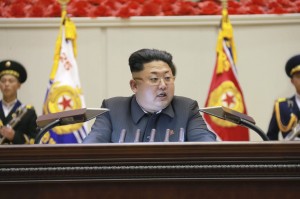
North Korea’s leader Kim Jong-un attends a meeting of Korean People’s Army (KPA) battalion commanders and political instructors in this undated photo released by North Korea’s Korean Central News Agency (KCNA) in Pyongyang November 5, 2014. (Yonhap/KCNA)
SEOUL, Aug. 3 (Yonhap) — All the members to the six-party talks aimed at dismantling North Korea’s nuclear weapons program are set to meet in Malaysia this week, drawing attention to whether any progress will be made in the nuclear standoff and other tensions among the neighboring states.
The six countries — the two Koreas, Japan, China, Russia and the United States — will join the Association of Southeast Asian Nations and other partner states for a series of annual ASEAN-led meetings to be held in Kuala Lumpur starting Wednesday. Among them, the security-focused ASEAN Regional Forum on Thursday is expected to be watched closely as it’s the only gathering to involve North Korea.
It will be their first meeting since the U.S. and other world powers struck a deal with Iran last month to curb Iran’s uranium enrichment program in exchange for sanctions relief.
Although officials and experts highlight major differences between Iran and North Korea, they also agree that fresh momentum has been added to the six-party talks due in part to the Iran deal’s demonstration that negotiations can work. The six-party talks have not been held since late 2008 after North Korea backtracked on past agreements.
Bringing North Korea back to the negotiating table has gained urgency especially as the communist state is widely expected to launch another provocation, possibly a long-range missile test, in October to mark a key anniversary of its ruling Workers’ Party.
South Korea’s chief nuclear negotiator, Hwang Joon-kook, recently said Seoul and Beijing share the notion that North Korea stands at a crossroads between completing its nuclear development and returning to denuclearization talks.
North Korea has so far indicated no interest in talks, insisting its nuclear weapons are a deterrent against U.S. hostility toward it.
The ARF will also set the stage for a meeting between Foreign Minister Yun Byung-se and his North Korean counterpart, Ri Su-yong. Expectations of a formal bilateral meeting are low, however, as tensions between the sides remain high over various issues, including Seoul’s efforts to increase international pressure on Pyongyang over its human rights abuses.
Last year, the two ministers briefly met on the sidelines of the ARF meeting in Myanmar, but they did not hold talks.
Both Koreas will likely engage in competitive diplomacy with the ASEAN states to include a clause in the chairman’s statement, which will summarize the discussions at the ARF meeting.
South Korea has sought to include a clause each year that urges North Korea to abide by U.N. Security Council resolutions and past six-party agreements aimed at North Korea’s denuclearization.
North Korea’s meetings with China and Japan will also be watched as their relations with Beijing have been frayed over the nuclear impasse and progress has been slow in efforts to resolve the issue of Japanese citizens kidnapped by North Korea in the past.
Talks are under way for a meeting between South Korea’s foreign minister and his Japanese counterpart, Fumio Kishida, as Seoul pays keen attention to an upcoming statement by Japanese Prime Minister Shinzo Abe, which will mark the anniversary of the end of World War II. Seoul wants Tokyo to offer a clear apology for its wartime atrocities, including its sexual enslavement of Korean women for its soldiers, but Japan maintains that the issue has been resolved by past administrations.
If the two ministers meet, they will also likely discuss preparations for a trilateral summit with China later this year.
Dominating the ARF meeting will be a fierce debate over the territorial dispute in the South China Sea, with China and the U.S. vying to have their voices heard.
South Korea’s position in the dispute has been that it is in its interest to maintain peace and stability in the waters that serve as a key trade route for the country.
On the sidelines of the ARF meeting, Yun also plans to meet with his counterparts from China, Russia, Indonesia and the European Union, said an official at the Foreign Ministry.
He said that South Korea is seeking to hold bilateral meetings with the U.S. and Japan, as well as a trilateral meeting with the two nations, but nothing has been decided yet.







